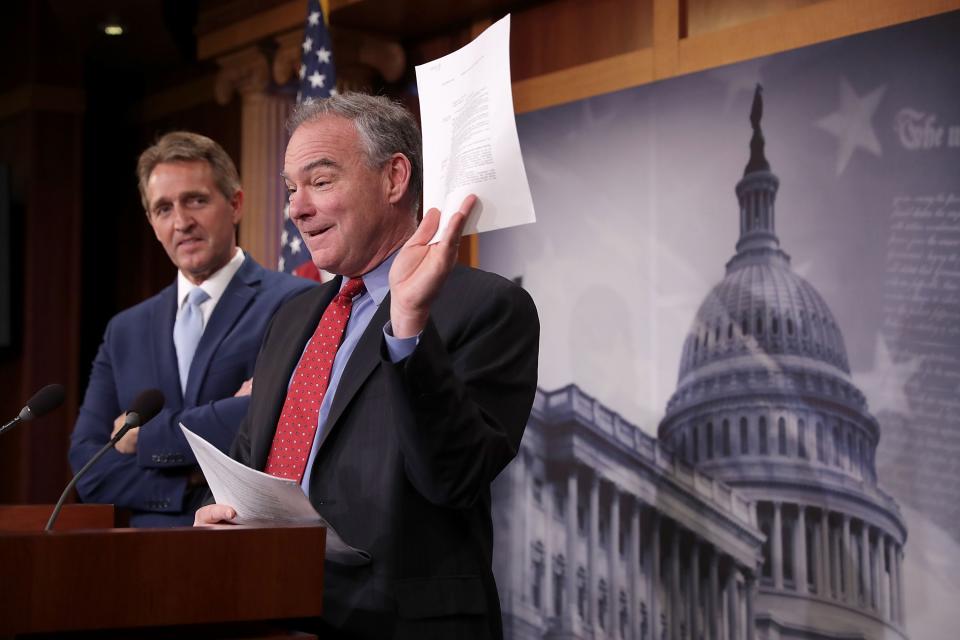Rand Paul's bid to sunset U.S. war authorizations fails

WASHINGTON — Sen. Rand Paul’s attempt to sunset congressional authorizations for the nation’s overseas wars failed Wednesday, with nearly all of the body’s Republicans and a sizable chunk of Democrats voting to table his amendment.
Sens. Mike Lee, R-Utah, and Dean Heller, R-Nev., were the only other Republicans to back Paul’s effort. More than 30 Democrats voted in favor of it.
Paul forced a vote on his amendment to the defense appropriations bill, arguing that the current 2001 and 2002 Authorizations of the Use of Military Force (AUMFs) are out of date and that the U.S.’s conflict against ISIS and other groups is illegal.
The amendment would have phased out the AUMFs in six months without replacing them, forcing Congress to explicitly define the parameters of its conflicts abroad by passing a new authorization during that time. The original AUMFs were aimed at fighting al-Qaida in Afghanistan and authorizing the Iraq War.
“That war is long since over, the war has long since lost its purpose, and it’s [a] long time [since we’ve had] a debate in Congress about whether we should be at war or not,” Paul said.
President Barack Obama requested a new AUMF for the fight against ISIS in 2015, which was dead on arrival when he sent it to Congress. But Obama has also insisted he had the authority to battle ISIS under the 2001 resolution, because the group grew out of al-Qaida.
Several senators from both sides of the aisle said Wednesday that they could not support the measure because it would strip the president of authority to fight the war on terror if no replacement passed.
“Repealing the 2001 and 2002 AUMFs without simultaneously passing a new authorization would be premature, would be irresponsible, and it would threaten national security,” said Sen. John McCain, R-Ariz., who shepherded the defense spending bill.
McCain said it was time for a new authorization, but that Paul’s amendment was not the way to do it.
“You can’t replace something with nothing,” Sen Jack Reed, D-R.I., said.
His colleague, Sen. Jerry Moran, R-Kan., echoed that sentiment. “In some ways we have the herd ahead of the horse,” Moran said.
The White House has made clear it does not want Congress to pass a new AUMF, though Donald Trump at one time said the president would need congressional approval to bomb Syria. He launched his own airstrikes in that country in April without explicit congressional approval.
“We stand by the 2001 AUMF,” White House Legislative Affairs Director Marc Short told reporters Tuesday. “We believe it provides us with the flexibility we need to execute our foreign policy.”
The AUMF debate is not going away, however. Sens. Jeff Flake, R-Ariz., and Tim Kaine, D-Va., have put forward a new war authorization that has yet to be debated in committee. (Flake voted against Paul’s amendment.) And in June, Rep. Barbara Lee, D-Calif., launched a surprisingly successful attempt to amend the defense bill with a demand for a new AUMF in the House with bipartisan support. Later, House leaders stripped her amendment from the final bill.

Some senators bluntly speculated about the political reasons their colleagues have avoided the tricky debate on authorizing a new war for 16 years.
“Most members of the Senate … do not want to cast a vote for fear they will vote the incorrect way as history will judge,” said Sen. Dick Durbin, D-Ill. Hillary Clinton, for example, was haunted during both her presidential runs for voting to authorize the invasion of Iraq.
Sen. Chris Murphy, D-Conn., said he feared that Congress would never vote on war again if it didn’t sunset the authorizations Wednesday, arguing that the body was abdicating its constitutional duty for political gain.
“It is very easy for the Congress to say authorizing military force is too hard, too difficult, so we outsource it to the executive branch,” Murphy said.
Paul threatened to torpedo all amendments on the defense spending bill if he was not given a chance to offer his, according to one of his aides.
“Who in their right mind thinks Congress will do their job without being forced to do their job?” Paul said on the floor. “Do your job. This is your constitutional role.”
Read more from Yahoo News:



